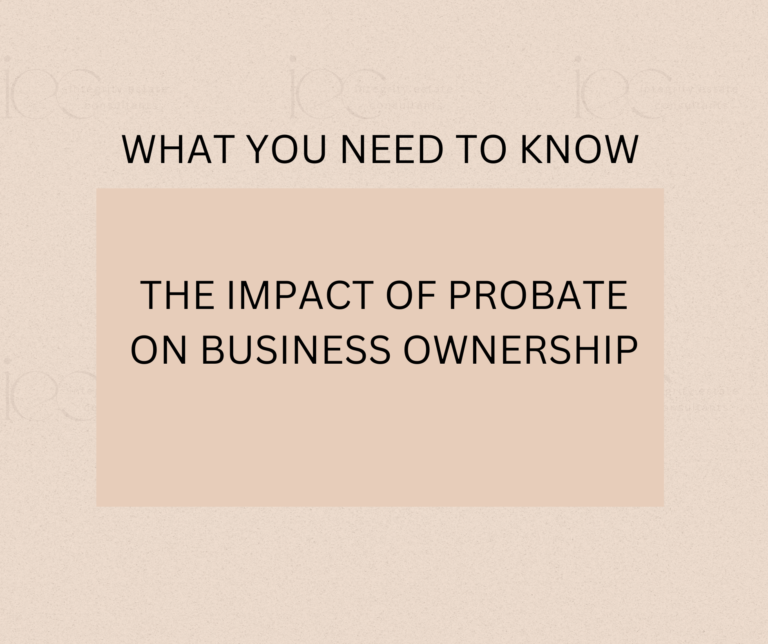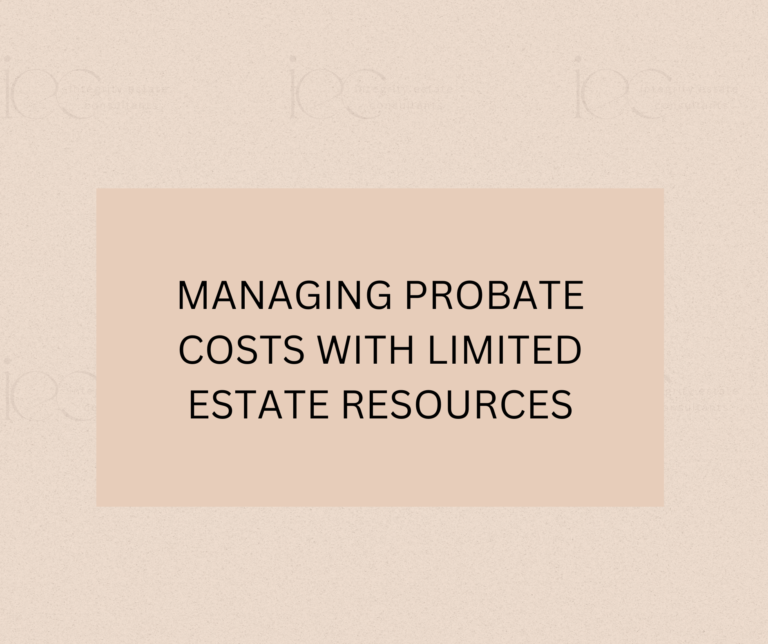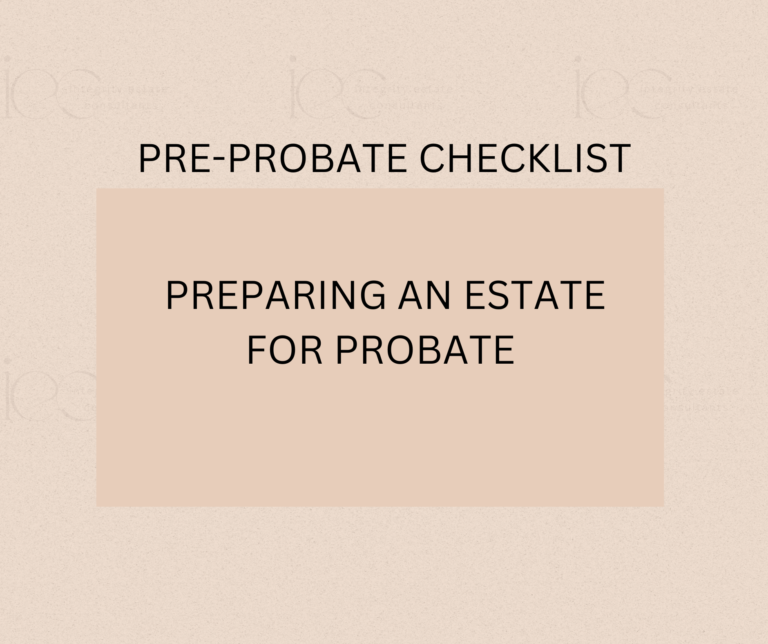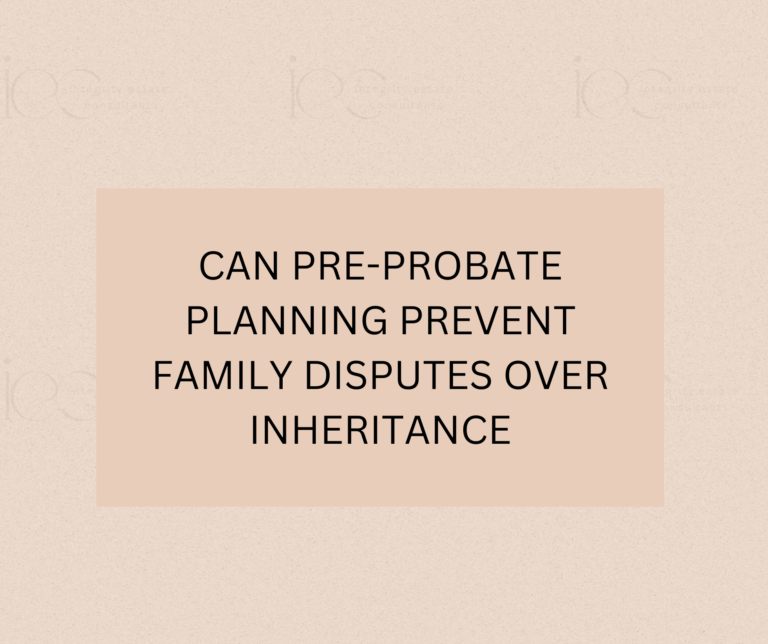a Good Pre-Probate Strategy?
Is Gifting Assets Before Death
When individuals begin thinking about the legacy they’ll leave behind, one common strategy that often comes up is gifting assets before death. This idea is particularly appealing for those looking to reduce their estate size to avoid high probate costs, minimize estate taxes, and ensure a smoother transfer of assets to their heirs. However, while gifting assets can offer significant benefits, it also carries potential risks and consequences that need to be carefully considered. In this article, we’ll explore whether gifting assets before death is a good pre-probate strategy, what factors to consider, and how it impacts the probate process and your overall estate planning.
About Us
At Integrity Estate Consultants, we pride ourselves on being the premier estate management and closure firm locally. Our expertise lies in assisting families daily, helping them navigate the complexities of their probate proceedings alongside their attorneys. Our goal is to help families return to normalcy by enabling administrators to close their estates as swiftly and cost-effectively as possible. We streamline the entire process, allowing administrators to focus on work, family, and other important matters, confident that their estate is being handled by a team of professionals.
Our knowledge is vast and far-reaching. We have helped hundreds of families and plan to assist thousands more by 2035. From the most complex estates to the simplest and even the downright messiest, we’ve seen it all and know our stuff.
Introduction
What Does Gifting Assets Before Death Mean?
Gifting assets before death refers to the act of transferring ownership of property, money, or other valuable assets to another individual (typically a family member or loved one) while the giver is still alive. This can be done through a variety of methods, such as outright gifts, creating trust funds, or making contributions to 529 college savings plans. By giving away assets during your lifetime, you may reduce the size of your estate, which could potentially lower the value of the estate that will go through the probate process after your death.
This strategy has become increasingly popular, as it can reduce estate tax liability, avoid probate court involvement, and ensure that loved ones receive assets without delay. But before moving forward with gifting as a pre-probate strategy, there are several important considerations to weigh.
Advantages of Gifting Assets Before Death
- Reducing Estate Size: One of the primary benefits of gifting assets before death is reducing the overall size of your estate. By giving assets to heirs or loved ones while you are still alive, you can potentially lower the value of your estate, which can reduce estate taxes and the complexities of the probate process. This strategy is often used to minimize the impact of the estate tax, especially for individuals with larger estates.
- Avoiding Probate: Probate is the legal process that takes place after a person’s death to distribute their assets. The process can be time-consuming, costly, and public. By gifting assets before death, you can avoid having those assets go through probate altogether. If you gift assets directly to heirs, they won’t have to go through the lengthy probate process, and this can result in faster distribution of the assets.
- Providing Financial Support to Loved Ones: Gifting assets during your lifetime allows you to see your loved ones benefit from your generosity. This can be particularly meaningful if you want to provide financial support to children, grandchildren, or others who may need help with education, home purchases, or other major life events. Gifting assets gives you the opportunity to have a direct and positive impact on your loved ones’ lives while you are still alive.
- Using Gift Tax Exclusions: The IRS allows individuals to give away a certain amount of money each year without incurring gift taxes. The annual gift tax exclusion amount for 2024 is $17,000 per recipient. This means you can gift up to $17,000 per person per year without triggering any gift tax liability. Additionally, lifetime exemptions allow individuals to gift up to $12.92 million in total without paying gift taxes, although gifts exceeding the annual exclusion amount may count against this lifetime limit.
Disadvantages and Risks of Gifting Assets Before Death
While gifting assets can offer significant benefits, there are also important drawbacks and risks to consider.
- Loss of Control Over Assets: Once you gift an asset, you no longer have control over it. For example, if you give away a portion of your real estate or financial accounts, the recipient now has full control over those assets. If the recipient experiences financial difficulty or gets into legal trouble, your gifted assets could be at risk. Additionally, if the recipient decides to sell the gifted asset or use it in a way that doesn’t align with your intentions, you won’t have any legal recourse.
- Impact on Medicaid Eligibility: Gifting assets can have unintended consequences if you or a loved one plans to apply for Medicaid or other government assistance programs. Medicaid has a five-year “look-back” period, which means that any assets gifted in the five years leading up to a Medicaid application may be considered as part of the applicant’s estate, potentially disqualifying them from receiving benefits. This is particularly relevant for seniors who may require long-term care.
- Gift Tax Implications: While the IRS allows for annual and lifetime gift exclusions, there are still potential tax implications for gifting assets. If you exceed the annual exclusion amount or the lifetime gift exemption, you may be subject to gift taxes. Additionally, the value of the assets you gift could count against your lifetime estate tax exemption, reducing the amount you can pass on tax-free at death.
- Unequal Distribution Among Heirs: Gifting assets during your lifetime can sometimes lead to disagreements or feelings of unfairness among your heirs. If one child or relative receives a larger gift than others, it can create tension and disputes, especially if the value of those gifts is not properly documented or communicated.
- Potential for Future Litigation: If you are gifting assets to individuals who later contest the gift, it can lead to legal challenges, especially if the gift is substantial or if the donor’s intentions are unclear. This can result in costly litigation that delays the settlement of your estate.
F.A.Q
No, while gifting assets can reduce the value of your estate and potentially minimize estate taxes, it does not eliminate them entirely. Larger estates may still be subject to estate taxes, and gifts exceeding the annual exclusion amount may incur gift taxes. Consulting with an estate planner is essential for understanding how gifting fits into your overall estate tax strategy.
Yes, gifts made before death are not subject to probate, as they are transferred directly to the recipient. However, certain types of property, like real estate, may require additional steps, such as updating the deed or making formal arrangements to transfer ownership.
Once an asset is gifted, the recipient legally owns it, and it cannot be reclaimed unless the recipient is willing to return it. If you think you may need the asset back in the future, gifting may not be the best option, and alternatives such as creating a trust may be more suitable.
When is Gifting Assets a Good Strategy?
Gifting assets before death can be a great strategy for some individuals, particularly those who are seeking to:
- Minimize estate taxes
- Ensure loved ones receive their inheritance quickly and avoid probate
- Help family members financially while they are still alive
- Take advantage of gift tax exclusions
However, it is important to understand that gifting is not always appropriate for everyone, particularly those with complex estates, substantial wealth, or concerns about future Medicaid eligibility. Before gifting assets, it’s wise to speak with a financial advisor or estate planner to fully understand the implications and make informed decisions.
Alternatives to Gifting Assets Before Death
For those concerned about the risks of gifting, there are alternative strategies that can help reduce estate size and avoid probate, such as:
- Creating a Living Trust: A living trust can hold assets for your benefit during your lifetime and provide for an easier transfer to heirs after death, without the need for probate.
- Joint Ownership: Joint ownership of assets, such as real estate or financial accounts, can facilitate the transfer of property to heirs without probate. However, this option comes with its own set of legal implications and risks.
- Beneficiary Designations: For certain assets like retirement accounts and life insurance, naming beneficiaries allows assets to pass directly to your heirs without going through probate.
Conclusion
Gifting assets before death can be a valuable pre-probate strategy in certain situations, particularly for those looking to reduce their estate size and avoid the complexities of probate. However, it’s important to weigh the benefits against the risks, including loss of control over the assets, potential gift tax implications, and the impact on Medicaid eligibility. Consulting with an estate planner or financial advisor can help ensure that gifting is done in a way that aligns with your goals and minimizes potential drawbacks.
DISCLAIMER
Integrity Estate Consultants, LLC asserts that we are not a licensed lawyer, and this article is intended solely for providing general guidance and information from our collaborative experience, and should not be considered as legal advice or a substitute for consulting with a qualified attorney. For any specific legal grievances related to personal probate cases, we strongly advise individuals to seek professional legal counsel and engage the services of a licensed attorney.



